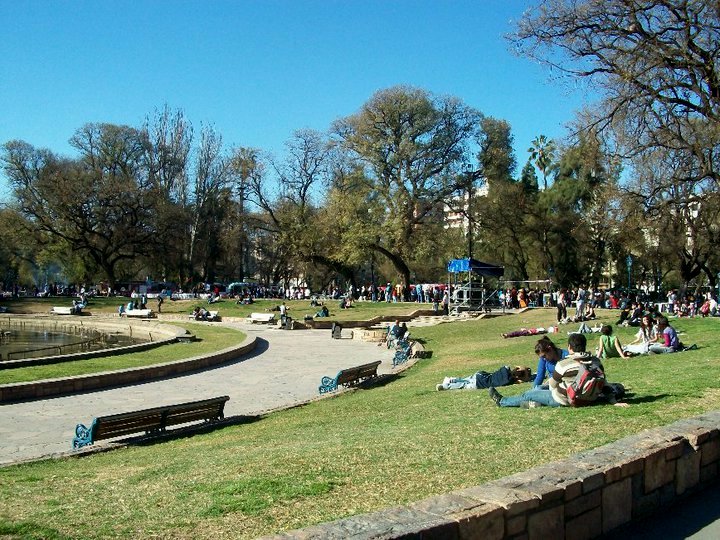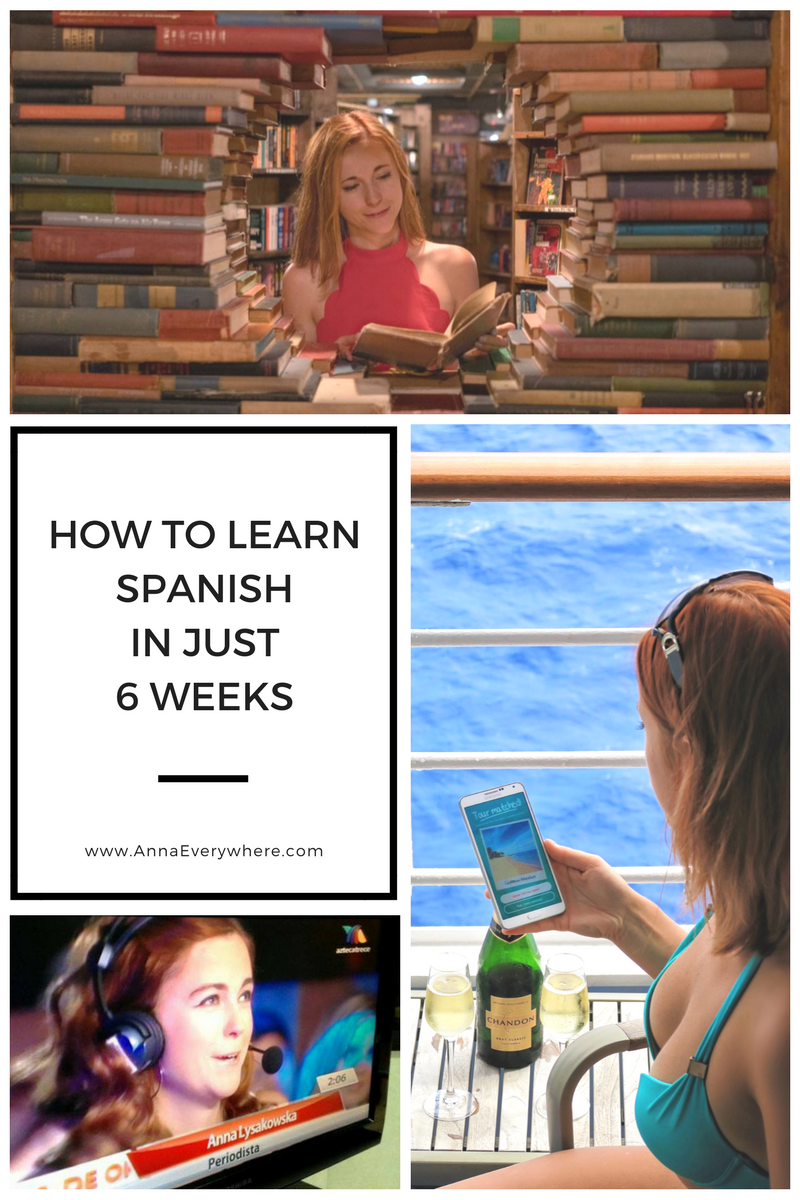How I Became Fluent in Spanish Fast in 6 weeks
When people find out that I managed to become fluent in Spanish fast in just 6 weeks, they usually don’t believe me. Some people take years to learn a language, some live in a place where the language is widely spoken and never learn to even properly construct a sentence. But I did it, and I believe so can you.
I’m definitely not a genius and my way of learning any language I speak isn’t particularly innovative either. I believe anyone can learn a language (with the same alphabet as their native language) quite fast, by using my method.
Is it frustrating at times? Absolutely, but overall it’s totally worth it.
How to Learn Spanish Fast (or Any Other Language)
I had never studied Spanish before. My parents made me learn German in my primary school and I chose French later on, so pretty much the only Spanish phrases I knew were: “Hola! ¿Cómo estás?” and “Gracias”. After graduating from university, I got an internship in Mendoza, Argentina. The internship I got was supposed to be at an English-speaking wine magazine, but once I arrived it turned out that I was supposed to speak Spanish. Oops.
Mendoza is quite a touristy place, where travelers come to see wineries, do whitewater rafting, and hike in the mountains. Hostel owners and tour guides obviously speak English. But, as I got there for work I was living with a host family in local parts of town where no one spoke ANY English.
My host family didn’t even know simple English words. I was terrified. Every time I wanted to ask them for anything I had to go to my room, compose the sentence with a dictionary, and come back to recite what I had learned.
I had to come up with a backup plan. The company agreed to send me to a Spanish course at the local language school for 3 weeks, and come back to work for them afterward. It seemed impossible at first.

My Method of Learning Spanish
Because the Spanish course was only 3 weeks, I had to make the most of it. Luckily for me, there were no other beginners, so my classes had to be individual ones. However, even with a private tutor, nothing is guaranteed. If I waited for my teacher to tell me what to do, I’d have finished the course knowing basic grammar and not much vocabulary.
Before I even started the course, I equipped myself with some Spanish coursebooks. I learned the basics myself so I wouldn’t waste time in class. If I can learn some things myself, why would I pay for someone else to tell me the same thing?
For Spanish, French, Arabic, and Italian, I used ‘Language in 3 Months’ books by PONS, however, I realized that they aren’t available in English (just German and Polish). Therefore, I’d recommend the Living Language book series and various other best books to learn Spanish I mention in this post.

Every day after my class I was researching and studying all the necessary vocabulary and grammar, so I could discuss it with the teacher the next day. I created sections of useful words (‘because’, ‘but’, ‘then’, ‘why’, .etc), food, animals, household, and words that I’d need, wrote down all words I could find, and studied each chapter every day.
I learned the grammar myself from the coursebook at home and in class I was able to ask my teacher what was unclear from the grammar section and practice words I’ve learned at home, instead of waiting for her to show me everything that was written in the book.
I’m a firm believer (thanks to my German teacher from secondary school) that grammar must come first because it’s harder to understand. You can keep learning more and more words once you know your basics.
For vocabulary, I got a thematic dictionary, but you can make your own thematic dictionary out of a regular one. This was where I got the most out of my teacher.
Every afternoon I read some bilingual books from the local library and watched tons of Argentinian TV. There are a lot of brilliant books that are written in a way you can understand, with an English translation on another page. Here are some more examples: Spanish Short Stories 1, Spanish Short Stories 2.

After only 3 weeks, I had to actually start working and using my Spanish skills. It wasn’t easy and I struggled a lot, especially because I had to interview a lot of native Spanish speakers, but it was manageable. I simply practiced what I’ve learned.
Whether I liked it or not, I was also forced to use my Spanish everywhere I went in Mendoza. I’ll never forget when I went to the pharmacy to get some bandages but I didn’t know the word, so I had to pantomime it. I must have looked no better than Bridget Jones at the Austrian ski resort, but what could I do? I had to go shopping, I had to organize things for myself, and I had to interact with the local community.
I finished my internship after 7 weeks and flew to Mexico. Upon arrival, I could freely speak to my Mexican friends in Spanish. We were all surprised at how quickly I learned Spanish, but it just goes to show that a lot of work and having a good system pays off.
My Advice for People who Want to Learn Spanish Quickly
1. Throw Yourself into a Place Where No One Speaks Your Language.
Going somewhere where you won’t be able to communicate with anyone isn’t easy. In the beginning, you’ll end up being frustrated most of the time. You must consciously lock yourself outside your comfort zone and not allow yourself to step back inside it for a while. But after all, you’ll thank yourself for this decision.
You don’t have to be in a country where it’s a native language. Not learning a language because of the reason that you can’t visit a place where it’s spoken is an excuse. Breathing the air of Argentina wouldn’t make me learn Spanish and many foreigners living abroad never learn a local language.
Technology makes everything possible these days. Stream some movies, download podcasts, books, do anything to have contact with the language. There’s even a plugin for Chrome that can translate some parts of a text that you’d normally read in English.

2. Take Latin in School or College
Yes, seriously. Many languages have words that share a common Greek or Latin root. They can be spelled slightly differently, but you’d have to try hard not to recognize them.
I studied Latin in college with a very strict teacher, and as useless as it seemed, it’s been the best thing I’ve ever done. Thanks to Latin, understanding its grammar structure and the origin of many words, learning any foreign language is now easier. I’ll totally introduce my kids to Latin early on.

3. Don’t Be Afraid of Making Mistakes – Just Keep Talking
Fluency and accuracy are two different things. When I lived in Italy, I became fluent in Italian, but far from being accurate. Speaking from experience, it’s better to be fluent at first and apply accuracy later. I might not have been always accurate in Italian, but at least I can speak.
Most people are usually afraid of looking stupid and don’t even try to speak a foreign language until they’re sure of their skills. That’s the biggest mistake you can make. Talk, make mistakes, and ask people to correct you. But learn words first, before you master your grammar.
Embrace your mistakes. For a very long time, I kept saying ‘mis cumpleaños’ instead of ‘mi cumpleaños’ which made my friends laugh at me that I have more than one birthday. Remember that many native English speakers can’t even speak or spell in English properly, so you learning another language is an achievement already.

4. Take Individual Language Classes
Group classes might be fun, but they won’t teach you as much as individual classes. Also, take advantage of the fact that the teacher is there for you. Ask questions about things you’re unsure of.
It doesn’t necessarily mean always paying for an expensive course. These days, there are plenty of language exchanges online. You can learn through Skype. My favorite site for finding natives is italki.com, with prices starting from $5 per hour.
As you can see in my Mexican dictionary, there are many differences between Spanish spoken in, for example, Mexico and Argentina. Most of the recordings in popular courses you’re listening to online aren’t real-life situations. In reality, people speak much faster in their own vernacular and that’s where your native speaker can help.
For language courses abroad I recommend either IH (International House Organization) or EF. I have first-hand experience with both places and can vouch for them being legit.
Remember, every new language you add is easier to learn. If your first language is English, learning a new language might be harder than if you were let’s say, French or German speaker. English basic grammar is less complex, so acquiring new rules might be challenging at first. Don’t give up!










I think your tips apply to every other languages, not just Spanish. Nothing speeds things up like when you have no choice but to do it.
That’s definitely true!
I’m in 8th grade and all of my friends speak Spanish but me!! I’ve been learning Spanish since 6th grade, but I can never get it right. It’s so hard to be focused on it too. What do I do??
We’ve learnt our Spanish in a pretty similar way. When we arrived in Barcelona 4 years ago we didn’t speak a word of it and even though it was possible for us to get jobs with English only, we had to find a flat, get registered, open a bank account and do all the official stuff you must do when you start your life somewhere new. I remember calling my landlord, who didn’t speak a word of English, for the first time and having problems understanding the time of the flat viewing. We arrived on time though 🙂
We were sharing a flat with a couple of really cool Italian guys who didn’t speak any English or Spanish, and were new in the city like us. And because we instantly got on amazingly well and knew we could be really good friends, we made a lot of effort trying to speak Spanish to each other. So the first evening we sat together with English-Spanish and Italian-Spanish dictionaries and tried to speak. It worked and after about 2 months we could freely communicate with each other. That shows that you can easily learn a language quickly if you force yourself to do it and if you’re not embarrassed of sounding like a retard 😉
Exactly! 🙂 However, if you look at the amount of American expats living in Holland for years without even a simple knowledge of Dutch (my own boyfriend is guilty of that lol!) I started to think that maybe because of our knowledge of already hard language like Polish it’s easier for us to learn any other foreign language 😀
The question is how to speek WELL in six weeks! 😉
You seem to imply that Spaniards and Latin Americans must be a bit slow since they obvious spend way more than 6 weeks to become fluent in thier own native language, more like many years. Were you fluent in Polish in 6 weeks? Spanish is not THAT simple, it’s not baby talk but rather a complex language, Iwould say more complex than English. I have difficulty believing cliams like this..or Benny
Lewis, fin3m. Depends on your definition of “fluent ” i suppose. Your English writing still sounds very “foreign” and stilted sometimes, do you consider it on a level higher or lower than your Spanish?
By fluent I mean being able to talk about everything, understanding anyone (considering different accents & slang) and not missing necessary vocabulary. I’d also add to talk with a normal speed, but many would argue against my opinion.
I agree Spanish is more complex than English – but so does any other foreign language, English grammar is simple 😉
GET EM GATES!!!!
There is a difference between fluency and a native mastery of a language. The average native Spanish speaker (Spaniards, Latinos) has more than 20,000 words in his/her active vocabulary. The average fluent (not native) Spanish speaker commands about 5,000 words, which make up a huge percentage of everyday Spanish conversation, allowing them to freely communicate in Spanish. So, when claiming fluency, Anna was simply referring to her ability to comfortably speak, listen, read, and write in Spanish. She wasn’t comparing herself to or belittling native Hispanophones. The part that reads, “some people take years to learn a language” was also clearly referring to people who take up Spanish as a foreign language. You took Anna’s words out of context and took offense at them for no reason.
Your remark is just rude. I’m a native American speaker and I think Anna’s English is outstanding.
Hi Anna,
I just discovered your blog and it is amazing, full of great tips!
If you don’t mind me asking how do you afford all the courses (MA, diplomas, etc.)? Education is quite expensive so I was just wondering. I did a MA abroad too but it costed me a lot of money and am still paying for it. I would like to study more but the cost of education is too high these days!
Thanks, Elisa
Hi Elisa! Thanks a lot!
Well, there is a way to study for less, but the options are very limited. Example: my BA in Poland was free and moreover I got a good GPA so the university paid me instead 😀 . When I started my degree in the UK I was fortunate enough that the fees were 3-4 times lower than now… Degrees in the Netherlands are cheap if you’re from the EU, so there are a few options. Also a lot of universities offer a bunch of scholarships 🙂
Great Post! I spent a few weeks at Spanish school in Guatemala and learnt a lot. What I lacked however was the confidence to just speak in Spanish outside of my host family and the school, it’s pretty sad, because I’ve forgotten a lot of it, but part of me dreams about heading to South America, so I want to try and relearn it again. Watching Movies and listening to music in the language you are learning also helps, just because you get used to hearing the rhythm of the words.
That is very impressive! Very very impressive!
So if I want to learn in 6 weeks, what Country or City should I go to b immeresed if money is no object?
Thanks so very much for all your advise. I must learn Soanish right away
I’d suggest Guatemala?
Why Guatemala?, and where exactly? Last I was there, they were robbing people at night along the highways . Although that’s been 20 years.
Guatemala because it’s the trendiest locale especially Antigua, you will see more foreigners/gringos than locals in the streets..
Great tips and a very interesting article, Anna!
“Throw yourself into a place where nobody speaks your language.”
in Antigua, Guatemala, often recommended there will definitely be hundreds, if not thousands of English speakers
I never said Antigua 🙂
Yes, Antigua makes no sense if there are many English speaking people. I spent 3 weeks in Costa Rica in a CPI school which was great however, the town Monteverde had too many English speaking people
Lloyd
Thanks for sharing 🙂 How many languages do you speak nowadays?
These days 6 🙂
Anna
I ended up going to,Cabo for 3 more weeks of private Spanish lessons. That’s now a total of 6 weeks of private lessons over the last 6 mo. I now may be appointed an ambassador to a South American country and really need to finish my lessons so I can speak and communicate reasonable so. The best for me would be to hire a teacher to live with my wife and I in Scottsdale to finish my process. Otherwise, I will be forced to go back to Cabo and learn. I only have 6 more weeks to finish and get fluent. I am very concerned , any thoughts or new ideas? Much appreciated
Yes! A live-in Spanish speaking person is great. But make sure she speaks ONLY Spanish as then you won’t be tempted to use English 🙂
@Lloyd, hi! Can you share which school in Cabo? Thanks!
Simple rules to follow:
1. Avoid your own language like the plague.
2. Constantly do a little work, every day. Much better than doing a huge amount once a week.
3. Read books, watch films, or listen to music in the foreign language – all three if possible.
4. Hang around only with the natives. No expats or any of that (see rule 1 above).
Within a year you should be passably capable, in two years or maybe three quite fluent.
WOW what a journey. I’m so glad you went to Argentina especially Mendoza! I started my Spanish Learning journey in Guatemala and made it all way down to Buenos Aires. I got so immersed in the culture(s) I have not been able to stop learning and Latin America become a part of my life. I’ve documented most of my experiences online. Which keeps me motivated.
Congratulations for your blog,it’s an inspiration for me. And incredibly how fast you learnt spanish, something not easy to do for most of us.
This has been extremely inspiring and helpful. It’s helping me chart a learning plan for myself so thank you!
That is a lie.. sorry. Maybe small conversations, ordering lunch, talking about the weather. I’ve been living in mexico for six months, my parents and friends speak Spanish, I’ve done all the apps.. I watch hours upon hours of spanish TV and movies.. I speak in spanish all day everyday for a year now and I still am at a very basic level. Some people I don’t understand at all, especially thick accents in northeast mexico. It takes years and years to get the the point of actual fluency. I have a friend living in mexico for three years and his spanish is still not so great and he is always asking questions still. I’m sick of hearing about these people who claim to be fluent in a few weeks because it’s not possible at all.
Happy to speak to you in Spanish if you don’t believe me 😉
I agree, I I am college educated and have 10 weeks of private lessons along with spending three months in Mexico and Costa Rica and barely can speak a few sentences and lines. I’d say at least a year in country to speak basic Spanish. Anna has lived and traveled in Spanish speaking countries for 10 years. Duh
Each person is different. After 10 weeks of private lessons, it sounds very suspicious that you can only come up with a few lines. I suggest you change your teacher and also read books in Spanish in your free time.
P.S. And nope, Argentina was the first Spanish speaking country I visited back then – nice try though 😉
but, she claimed she became “fluent in 6 weeks..” hey even faster than Benny Lewis, who can speak 34 languages & variants, after 3 months in each, when you count different dialects & accents
he can fool a person in Lisbon or Rio de Janeiro into thinking he’s lived there his while life, same in Madrid, Medellin, Paris, Montreal..
LOL I’ve seen his YouTube vids, he has a THICK Irish accent in all languages, including Spanish which he claims is his best foreign or non-native language.
OR he’s deluded and actually believes people when they are being POLITE & say” you speak perfectly”
salespeople never ever lie when they are selling though
yeah..right.
I don’t know about salespeople, but you just responded to your own comment claiming that you’re right about 6 times using different names but same IP, so forgive me but I decided not to approve ALL your comments 😉
A ver tia, ?que tan bien lo hablas? Estoy aburrido y francamente me interesaria obtener algunos consejos sobre como aprender frances y aleman mas rapido. Por cierto como veo que eres muy aplicada, debo mencionarte que no he puesto ningun acento o nada por que no tengo teclado para hacerlo mas rapido… y como no me dan ganas de presionar la serie de numeros pues no lo hice. Por cierto el ingles lo aprendi a hablar completamente en 9 meses, no es por presumir.
Creo que para ti aleman va a ser mas dificil que frances, porque frances es mas parecido a espanol. Te recomiendo empezar con los libros de self-learning para que entiendas la gramatica. Luego puedes empezar a ver las peliculas en frances y aleman, pero activa los subtitulos en estos idiomas para que puedes escuchar y leer en los mismo tiempo. Tambien hay muchas personas online interesadas en el ‘language exchange’ si quieres practicar.
I love this. My Spanish is trash and even I Notice minor mistakes here. I’m crippled by the fact that I never want to make a mistake when trying a Foreign language. That’s why I can read Chinese reasonably well but almost 0 ability to speak. You’re an inspiration to me, bravo
Btw how many languages do you speak?
6
Amazing! 🙂 I’ll also try this, I feel that I could also learn Spanish in 6 weeks. 🙂
Hi Anna!
Thanks for your informative blogg!
Some questions:
*Which languages you speak appart from english, spanish, polish and german?
I want to learn arabic (and many other languages too later).
*Can you advice me which arabic to learn?
*Are you still living in México? Where in that case?
Con mucho cariño,
LUIS
Have you read my about page? https://annaeverywhere.com/about-2/
I don’t live in Mexico anymore. I started learning Arabic, and I enjoyed it, but unfortunately, I didn’t have enough time to continue. All courses and books will focus on Modern Standard Arabic. Later on, you can focus on dialects, but it really depends where do you want to practice your Arabic.
Gracias por comentar Anna, lo siento por ser presumido. Es que soy un puberto con un poco de envidia de solo poder hablar bien bien dos lenguas… Mientras hay gente que se cría aprendiendo tres y hay gente que sabe un montón como tú. Admiro mucho que hayas aprendido tantas lenguas, y pues, !ahí le voy!
Sinceramente,
Un chavo de prepa que es casi trilingüe que además, está muy, muy cerca a aprender a hablar en Deutsch en presente.
Tschüs
PD. Ich komme aus Mexico
And if it takes you forever to become fluent in Spanish, like it did for me, then that s okay too! Everyone learns at a different pace and comparing yourself to others won t help at all.
Anna, thank you for the inspirational story. I’m two years into my study of Spanish, and I’m just now getting the courage to speak with others. I know I will progress quickly now, not being afraid of mistakes, rather, trying to make myself understood.
-Kirk
p.s. that is the coolest picture ever, you in the tunnel of books!
Interesting facts about the Spanish language:
Spanish is the official language of 21 countries. More than 400 million people speak Spanish language in the world. Spanish is the third most widely-spoken language, only after following Chinese and English. By 2050, there will be 530 million Spanish speakers, with 100 million speakers living in the United States.
Hi, my name is Philip Rossen. Your tips to learn Spanish are great. I have tried to learn the language for a few weeks. It takes a lot of time to learn the basic words and grammar.
Good stuff Anna! Reading through the comments, I’m kind of surprised some of the people would post with such cynicism and disdain . Pero supongo que siempre hay odian por ahí.Sin embargo, su historia es inspiradora y aprecio los consejos!!
Dear Anna,
This is a really interesting post and while I mostly agree with your techniques for learning a language (I did what I expect is about the same thing in about four weeks with Portuguese in Brasil), I don’t completely agree with your rationalization. Firstly, I don’t think I agree with your definition of “fluent.” Of course, you don’t actually define what it means to you, so that makes it more difficult to know if I actually agree with you or not. After four weeks of studying at a Portuguese school and living with Brasilians, I could communicate in the language and understood almost everything. However, I relate fluency more towards the end of being bilingual than being able to communicate, which in my case took another 9 months.
Secondly, I think you highly underestimate the fact that you already knew other languages and you studied Latin. For example, when I learnt Portuguese I was already pretty good at Spanish (B2 level – again, I don’t know if I would call this fluent). In addition, I can communicate with about 60% accuracy with Italians having studied no Italian at all and can read a decent amount of French with no training.
So, while I agree with your overall evaluation on how to learn a language quickly, I think that there are some things that might not fit to other people’s perception of your experience (and hence why they might not believe you as stated in the first paragraph and the comments).
Kind wishes,
Claudia
Hi Anna
thanks for sharing.
Aprender cualquier idioma no solo requiere de tiempo, también de entusiasmo como el que tu proporcionas, me agrada tu actitud.
puedo recomendar ampliamente complementar estas técnicas para mejorar el aprendizaje.
Hi Anna,
Thanks for sharing!
Learning a language in 6 weeks is definitely a major tribute!
I am also interested in learning languages but I’m not exactly sure which ones I should learn. Which languages will you consider to be the most useful in terms of career outlooks and travelling as I also love
I am interstate in Scandinavian culture but am aware that those countries all speak near fluent English so it many not be so useful. You learned Dutch, Netherlands speak quite good English, did you get to use the language much?
Also, just wondering, did you learn your 6 languages because it was a requirement at a certain point in your life or did you learn any purely for interest?
Thanks
Best wishes!
It really depends on where do you live and what do you need it for. For instance, in Europe less common languages (eg. Finnish, Danish, Hungarian) were in demand, but companies in the UK, Netherlands or Germany were only looking for native speakers of these languages regardless of your fluency. Simply because they could.
I used Dutch a lot because I moved to the Netherlands. Plus I keep on running into Dutch people on my travels and always get along 😉
In Europe they teach everyone English + another language in school and that’s a requirement, but it’s only basic. If you want to learn more you need to sign up for a language school or learn on your own. I had to learn Spanish as I wanted to live in Mexico, but other languages were purely for interest.
Hi Anna
Thank you for sharing all that you have, it’s very much appreciated.
I am 55 years young but have never learnt another language, but I am passionate about learning Spanish. I went to Colombia for the first time earlier this year (have fallen in love with the place, the culture). I used google translate a lot out there lol, forced myself to verbally speak a few phrases from translate, the people there always appreciated me trying, sometimes I didn’t make sense, but sometimes it worked. I’m learning a few words here and there and a few phrases, but my learning is really slow. I would like to be able to understand a Spanish conversation and be able to verbally speak in conversations, other than a word or two, by the end of this year. Is it possible ? And how should I go about this? I’m seriously thinking about getting a temporary job in Spain for say 3 months. Your thoughts and comments would be appreciated
Of course it’s possible! You could do in-country a one-on-one course as then you’ll be forced to stay focused on the class vs in a group you don’t always have to.
Fluent in six weeks, hilarious. That’s not fluency, that’s being able to communicate and understand little bit in six weeks.
I see you must know me very well since you can judge my language abilities 😉
Hi Anna,
Very impressive and well-written blog. My story of learning Spanish is more strange. I started it all by myself in India 4 years ago. So, forget any spanish-native or expat, there was no one who even knew Hola o Como estas!! I started with the you-tube videos in CultureAlley, then went on with Duolingo. These helped me in master the basic vocabulary. But when I attempted to watch Amoresperros without English subs on, it turned out to be a nightmare!!! Later, I realized that I need to improve my grammar. Online resources were helpful, and I started to watch movies with Spanish subs, starting from El Laberinto del fauno, Y tu mama tambien, Amores Perros, and went on to watch many spanish-language films with Spanish subs, which helped me in appreciating the language and its slangs much better. Today, I am in the UK and I am able to converse freely with a few Mexicans, Spaniards, and Argentinians, whom I come across in my uni. I am able to speak pretty fluently with them and understand what they are talking about, and even respond to them better. But the problem is that when I go on to watch series and movies in Spanish, I struggle a bit without the Spanish subs turned on. Could you guide me on overcoming this plateau???
Great tips! I have been trying to learn Spanish as well – have got to the basic conversation level. Agree that total immersion is the best way to pick up a language.
IYour recommendations in learning Spanish make me feel at ease to using it.I just used it a couple days ago for the first time with a woman Uber driver and I did good! Thank you for your words of support, I learned Spanish in jr high, hi school, college and still learning using the Duolingo app (I highly recommended to the driver – can learn 40 since 2021 and was so nervous to talk but I did it and used my phone to get Spanish words. Fluency can be muddled but not accurate as you indicated.Thanks again!